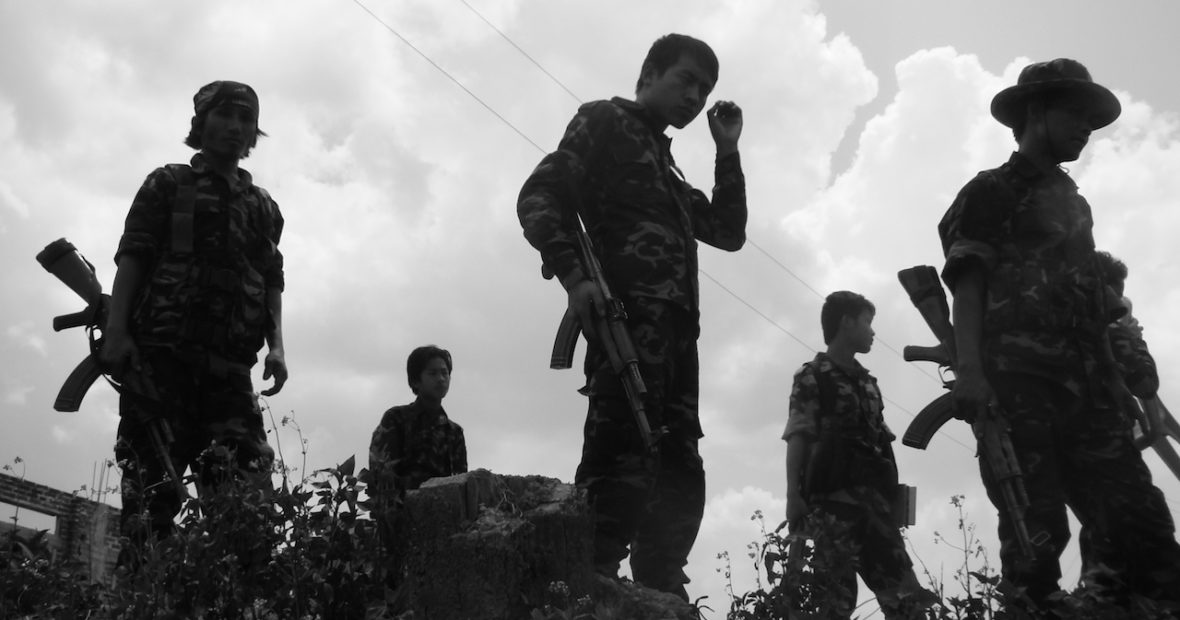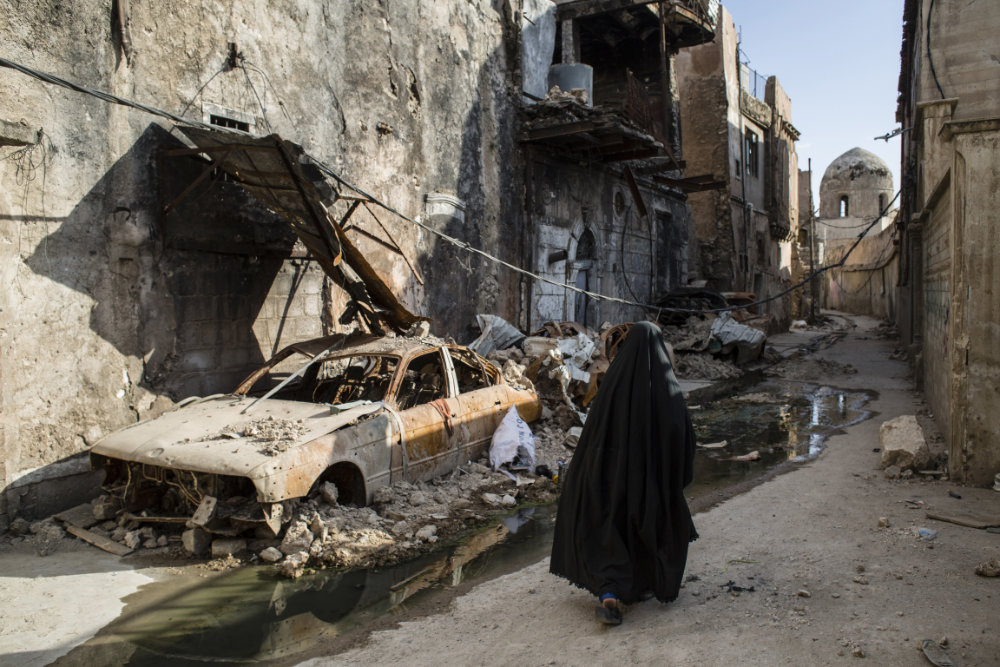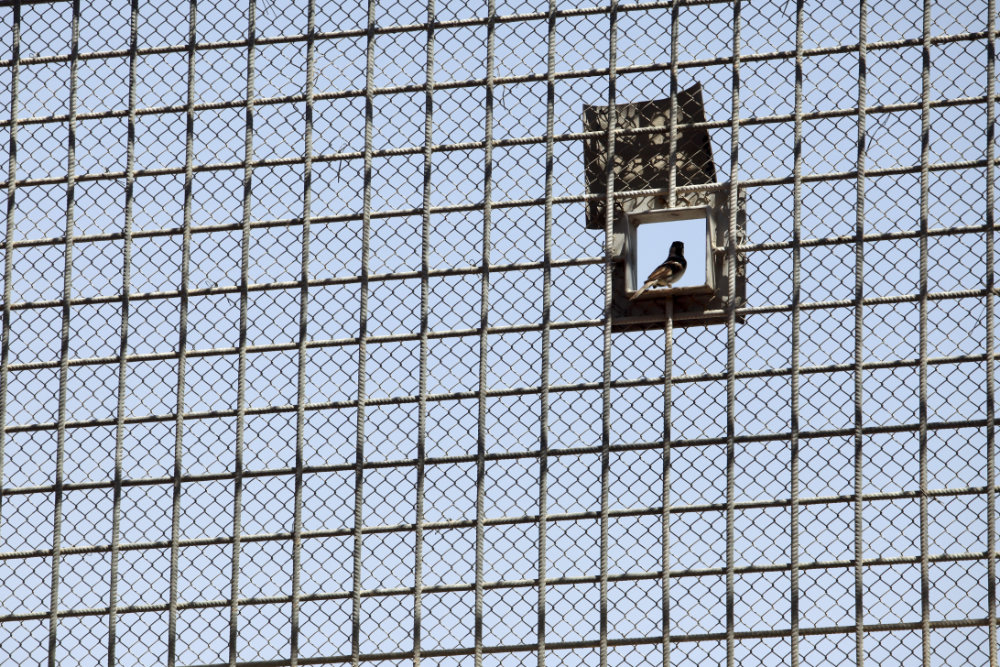The report is based upon the second edition of the Garance Talks held in November 2017 with fifteen experts from academia and relevant international organizations. Also present was a former high-level military commander from the Revolutionary Armed Forces of Colombia—People’s Army (FARC-EP), a judge from an area controlled by the Free Syrian Army/Southern Front in Syria and a judge from the Sudan People’s Liberation Movement-North (SPLM-N), each contributing experiences they have faced when administering justice. The meeting focused on the following: i) the legal basis for the establishment of courts and judicial processes by ANSAs and in territories controlled by ANSAs; ii) deprivation of liberty by ANSAs, including the treatment of detainees; and iii) the procedural safeguards of detainees.
Administration of justice as a practical concern
The administration of justice by ANSAs is far from a merely academic exercise. Armed groups often try enemies, civilians and their own members. Real-world examples included in the report demonstrate the importance of analysing this phenomenon. As the ICRC has noted, ‘[a]lthough the establishment of [ANSAs’] courts may raise issues of legitimacy, trial by such means constitute an alternative to summary justice and a way for armed groups to maintain “law and order” and to ensure respect for humanitarian law’ (para 689).
In February 2003, for instance, the Mouvement de Libération du Congo (MLC) tried twenty-seven of its members for extortion, rape, assassination, looting and disobeying orders. In Sri Lanka, the Liberation Tigers of Tamil Eelam, at one point, established a judicial system involving six district courts, two high courts and an appeal court. In India, the Naxalites established a system of people’s courts. More recently, a former member of a Syrian ANSA was sentenced to life imprisonment by a Swedish court for violating international humanitarian law (IHL) through his participation in the killing of seven individuals. In that case, the defence argued that the killings were the result of a death sentence by an ANSA’s court, following a trial. In Syria, local opposition authorities claimed to have appointed judicial councils ‘that review accusations against detainees and issue sentences’. Interestingly, while in certain towns the councils relied on Sharia law for civil matters, for criminal law issues they referred to Syrian criminal law. Issues related to the administration of justice have also been included in several ANSAs’ internal rules, such as the Taliban’s Code of Conduct, and the Sudan People’s Liberation Army Act.
A capacity problem
Although IHL applicable to ANSAs has existed for more than sixty years, it is only recently that practitioners and scholars have focused their attention on issues related to compliance for this legal regime (see, among others, here, here and here). Their main legal obligations under IHL related to the administration of justice can be found in Common Article 3 to the 1949 Geneva Conventions, Article 6 of the 1977 Additional Protocol II and Customary IHL. Even if a detailed analysis on the reasons why armed groups do or don’t respect these provisions would be useful, we can identify several general explanations. These include, for instance, ANSAs’ unwillingness to acknowledge that a situation of violence amounts to an armed conflict, or their deliberate decision not to respect IHL (p 357). Similarly, it has been argued that ANSAs may breach humanitarian norms as these rules ‘prohibit the sort of actions that often serve the strategic interest of rebel groups—the sort of actions that may, at times, give them a competitive advantage over government forces’ (p 6). Other explanations stem from ANSAs’ lack of appropriate organizational structures and resources which would allow them to acknowledge, understand and implement their obligations. Fragmented and decentralized ANSAs are useful examples in this sense.
The exchange with ANSAs during 2017 Garance Talks identified their lack of capacity or resources as a key aspect for why armed groups may not fulfil some of their legal obligations. Many groups—in particular those with a lower level of organization, a fragmented structure with a weak coercive capacity for enforcing organizational decisions, or with decentralized authority—have less potential to guarantee the administration of justice in accordance with the standards enshrined in IHL. This can be due to the fact that ANSAs devote a large amount of their resources to their military wing. ANSAs, at least in most cases, are not created with the objective of performing judicial functions, but rather military ones. Moreover, if they don’t have a sophisticated organization, they might not have an independent and impartial authority that can carry out due processes which would allow, for instance, the accused to have the time beforehand to prepare his or her defence. Furthermore, ANSAs may not have specific units, separate from those with a purely military nature, which are able to carry out law enforcement operations. They may also lack knowledge of the relevant IHL rules applicable to the administration of justice. Since in any given society only a few people are generally aware of legal concepts, it should not come as a surprise that the members of ANSAs would not know what fair trial guarantees are provided for by international law. Furthermore, ANSAs’ understanding of judicial processes may not be the same as those found under IHL.
The ICRC has taken into account some of these structural challenges, stating that ‘[n]o trial should be held, whether by State authorities or by non-State armed groups, if [the minimum] guarantees cannot be provided. Whether an armed group can hold trials providing these guarantees is a question of fact and needs to be determined on a case-by-case basis’ (para 694).
Two problematic scenarios can be identified when addressing ANSAs’ lack of capacity to carry out judicial processes: the prosecution of foreign fighters by ANSAs in Syria and the meaning of ‘independence’ and ‘impartiality’ for ANSAs’ judicial bodies. The former has entailed either the involvement of States to seemingly carry out capacity-building activities, or lack thereof, and the latter has been a challenge for those groups with a low level of organization.
Prosecution of foreign fighters by ANSAs in Syria
An important concern has recently been raised in the Syrian context. The French government declared that French fighters who joined the Islamic State (IS) group, and who were detained by the People’s Protection Units (YPG/YPJ) in Syria could be tried in courts established by YPG/YPJ through their civilian administration. At the time of writing, the French government is still against ‘an active policy of repatriation’ (see also here for a recent update). The report of the Independent International Commission of Inquiry on Syria published in February 2018, although focusing on the Syrian Democratic Forces (SDF), explained that
[w]hile [it] had indicated that it was seeking to return foreign fighters […] to their country of origin, they reported that States had thus far declined to repatriate their nationals, which left them in legal and administrative limbo. Syrian nationals held as ISIL fighters will reportedly be ‘judged’ by ‘courts’ affiliated with Syrian Democratic Forces (para 68).
Human Rights Watch expressed its concerns about these trials, affirming that those detainees would face unfair procedures: ‘[i]t shall be noted that we are talking about a rather rudimentary judicial system: there is no right to defence nor court of appeals’. Recently, Jonathan Horowitz affirmed that in order for the SDF and the Kurdish authorities to carry out detentions in humane and sustainable conditions, advice and assistance from foreign States and other international organizations would be necessary. Some might claim, as he argues, that ‘such an investment will only exacerbate the complex problem […] [b]ut whether the detention sites are sustainable or not, fighting forces will capture and detain people’. The New York Times indicated that the United States military is providing assistance for the SDF to upgrade and improve their detention facilities. Interestingly, however, the Kurdish authorities have recently requested the transfer of foreign fighters detained in Syria to their country of origin. In any case, American Special Operations ‘visit the prisons multiple times a week to offer expertise about how to secure and run them, and to help process new captives using biometrics and interrogation’.
The meaning of an ‘independent’ and ‘impartial’ court
Considering the level of organization required by international law for a group of individuals to become an ANSA (Boskoski, paras 199–203), a key question is whether the requirements of independence and impartiality can realistically be expected. Under IHL, these notions can be found in different sources. Although not explicitly included in Common Article 3—which refers instead only to ‘regularly constituted courts’—Article 6 of the 1977 Additional Protocol II specifically affirms that ‘[n]o sentence shall be passed and no penalty shall be executed on a person found guilty of an offence except pursuant to a conviction pronounced by a court offering the essential guarantees of independence and impartiality’ (emphasis added). Rule 100 of Customary IHL includes as a judicial guarantee that the trial be conducted by an ‘independent, impartial and regularly constituted court’. The Elements of Crimes of the ICC Statute considers that a ‘regularly constituted court’ in the context of Common Article 3 is one which affords ‘the essential guarantees of independence and impartiality’ (p 34).
For ANSAs, however, having independent and impartial judicial bodies can be extremely challenging. Although the legal basis for applying international human rights law to ANSAs is not yet settled, and there is no uniform view on why and when groups would be bound by this legal framework (para 517), human rights bodies have defined these notions. Accordingly, independence mainly refers to the institutional independence of the body, and in particular, independence from interference by other branches of the ANSA, especially the ‘executive’, as well as the procedures for the appointment of those in charge of carrying out judicial tasks (here, at 210). The European Court of Human Rights (ECHR) held in Bryan v. UK that ‘[i]n order to establish whether a body can be considered “independent”, regard must be had, inter alia, to the manner of appointment of its members and to their term of office, to the existence of guarantees against outside pressures and to the question whether the body presents an appearance of independence’. Impartiality has been described by the ECHR as including two aspects: subjective impartiality and objective impartiality (para 35). Some commentators have argued that in relation to trials by States, ‘tribunals which include members of the military have frequently been perceived as lacking in objective impartiality because, in trials of rebels, it is often the military that is involved in fighting such rebels’ (p 473). A similar argument could be made with respect to trials carried out by ANSAs of their enemies, as they could lack this impartiality.
As one expert mentioned during the Garance Talks, these notions, as applied to ANSAs, need a reflection on the structural links within the groups with regard to the body or wing in charge of carrying out judicial activities—if there is any—and the other branches of the group, such as those with military and civilian tasks. Of course, a separation into different branches would presume the existence of a highly organized ANSA. When dealing with groups that have a lower level of organization, Geneva Call’s experience shows that it is often the military commander of the group who handles these ‘judicial’ responsibilities.
Concluding Remarks
As the exchange with the different ANSAs during the meeting showed, in practice ANSAs face capacity problems when dealing with their obligations on the administration of justice. One conclusion that can be drawn from this is that the better organized a group is, the more international rules could become applicable to it (p 430). This ‘sliding scale’ was seen in particular when the participants’ internal rules and procedures were analyzed. While the Syrian representative shared detailed sources applicable to their judicial activities (see here, here and here), the FARC-EP explained that only in exceptional cases detainees would have access to defence lawyers (p 13).
Considering the above mentioned difficulties, it is possible conclude the following. First, when an ANSA does not have the capacity to respect those judicial standards enshrined in IHL, it should not carry out judicial processes and alternative mechanisms should be sought. Second, when the structure of the group varies and it is not stable, it should only carry out judicial processes as long as it has the capacity to do so. Third, when the group has the capacity to carry out judicial processes in accordance with fair trial guarantees recognized under international law, then everything feasible must be done to respect them in full. ANSAs should be encouraged to look for external support in their attempt to respect humanitarian norms related to the administration of justice. A key policy question in this sense is to what extent the international community should support ANSAs in order to enhance their capacity to respect international humanitarian legal norms in a given territory and for a given group of individuals under their control. Solving this issue is essential. It is often underestimated, even though several ANSAs have expressed their desire to engage with States and international organizations about their lack of preparation on how to maintain the law and order in the territory they control.
DISCLAIMER: Posts and discussion on the Humanitarian Law & Policy blog may not be interpreted as positioning the ICRC in any way, nor does the blog’s content amount to formal policy or doctrine, unless specifically indicated.






Dear Ezequiel, It is great to read you in abridged version. As regards the case of France and its citizens who were fighting in Syria, have there been considerations for referring the case to the ICC? France (or any other State party in a similar situation) could argue it was not willing or capable of exercising jurisdiction and therefore requesting the ICC to take the case as alternative to a detention and a trial by a non state armed group? This could possibly pave the way for some succeful use of the ICC outside Africa.
This is of course a very paculiar case that does not undermine the fundamental question of capacity. Building and recognising that imperfect justice may at times be better Than any option available?
Best regards